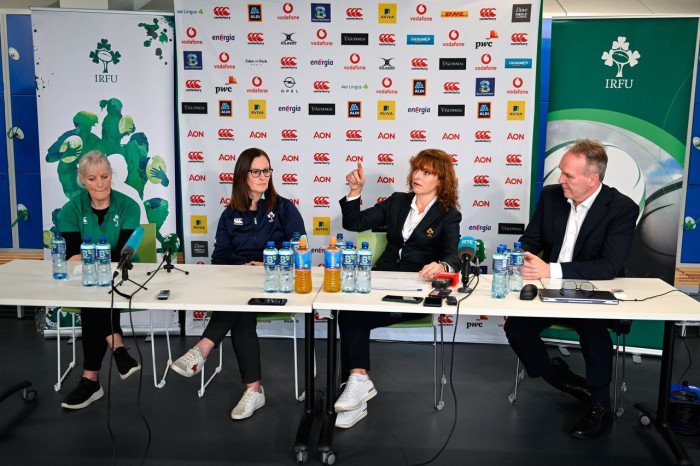Ireland plead for patience amid new resources
Following their poor performances in the Six Nations, the IRFU have emerged with new plans to develop the game there, and answered questions about the departure of head coach Greg McWilliams.
Published by Alison Donnelly, May 10th, 2023
6 minute read

It's been a torrid few months for Irish women's rugby.A string of poor performances and five straight losses in the Six Nations played out amid stories about alleged sexism around the Irish game.On the back of sitting out the World Cup last year, media and public criticism of the union's support for the game was ramped up, with CEO Kevin Potts this week fronting up to set out plans for change.
Such has been the environment around the programme, that most of the immediate coverage has focused on Pott's denial that there is sexism within his own organisation and the explanations given as to why Cliodhna Moloney, Exeter's in-form hooker, is no longer being picked for the national team after outspoken language last year.
But Ireland did also announce significant new resources, with the start of a shift towards strengthening regions and a ramping up of staff working solely on the women's game.
Eight new coaches have been hired who will work with emerging talent aged 16-23 across five centres of excellence in universities in Dublin, Carlow, Limerick, Galway and Belfast.New
Although Ireland’s senior players are still likely to be based in Dublin, this shift may lead to the country’s top talent having the ability to be based elsewhere in the country – while the IRFU are also understood to be revisiting the rigidity of their contract offer, with hybrid deals likely to come into play, opening up the talent pool even wider.
With the IRFU investing relatively significant sums on the women’s game (over 6m euro annually) and with Potts sounding committed to improvement, the question lingering from this week’s news is less whether there is the care and will to change (there clearly is and that itself is progress) and more whether the IRFU have the right plan to spend that money in places that will make a difference.
Because even with the undoubted benefits that a regional talent focus will bring, Ireland are persisting with a domestic structure that will make it difficult for players to be exposed to genuinely top class competition – the kind that their counterparts in France, England and Wales at least are getting every week all season long.
Sticking with a three weekend Interprovincial competition at the start of the season and relying on the Celtic Cup to prepare its players for the Six Nations (a competition that Wales and Scotland see as a development one) means it’s still hard to see how Ireland will be competing at the top end of the Six Nations within three to five years (which is what they said they are targeting yesterday)
The IRFU are frustrated at a lack of patience with the development of its women’s programme – pointing out that it took years for the Irish men’s team to become competitive after turning professional.
This is of course true, but the women’s game is turning pro in a totally different era and with vastly different variables at play.
Wales for example became much more competitive almost immediately after handing their players contracts, but they were significantly aided by the fact that all their players are playing in a world class domestic league, and Ireland enjoyed great success before they ever paid their players, with those solid foundations lost amid years of poor planning and weak performance development.
This means surely that the number one priority in Ireland must be the development of a much-improved domestic high-performance pathway – which is not just about getting players more game time, but about setting a programme where the best players are both training at a high level for 20 or so hours a week and playing more games at the highest level standard. This is even more important given the IRFU's desire for their top players to all be playing in Ireland.
Ireland’s decision to stick to its current domestic format though means that for next year at least nothing is changing on this front.
It was hard also not to get the sense that the relationship between the union and clubs is still often fractious with Fiona Steed setting out a long personal defence of her work in particular to bring stakeholders to the table and make change collectively.
It is perhaps unfair to suggest that her words did not make it sound like this process was particularly being approached as if all sides were equal, but it was certainly difficult to believe that everyone is pulling in the same direction – something that is absolutely crucial if real change is to happen. It is also surely peculiar too that a voluntary committee member seems to be leading a crucial part of the jigsaw and answering vital questions on performance, regardless of their experience.
We can never take investment in women’s rugby for granted – so it is up to Potts as the union’s chief accountable officer to make sure that he is satisfied that Ireland are on the right path and that he has all the right people advising and taking decisions on the future of the women’s game.The union pleaded for time yesterday – with a World Cup in 2025, they won’t get loads of it, but if they believe this is the right plan, let’s give them that.